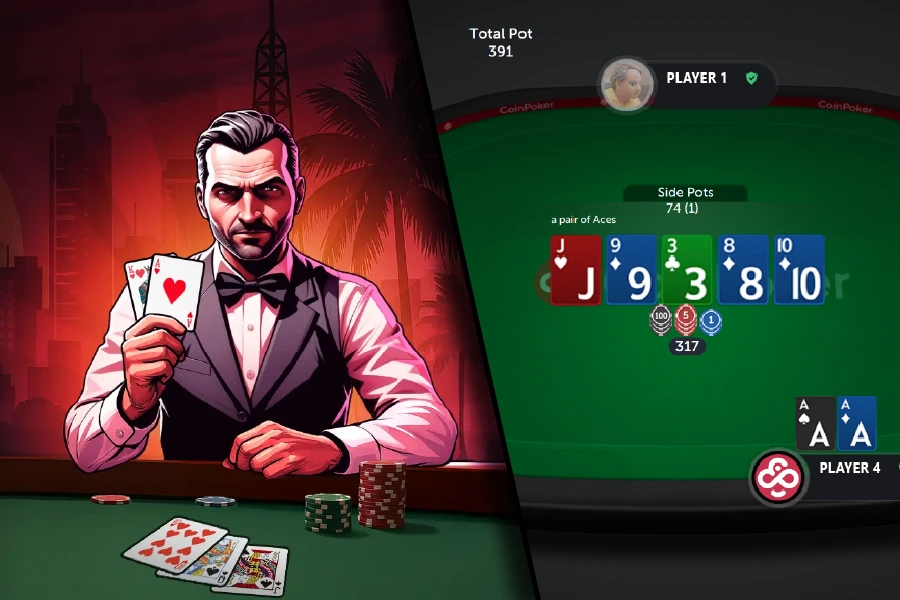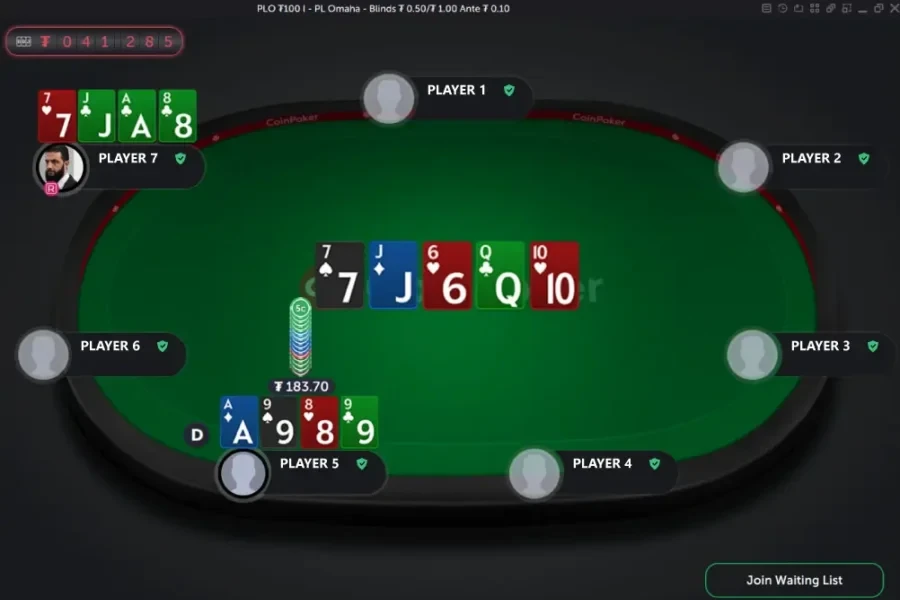Last Updated: 4 February 2026
Online Poker vs Live Poker: Which Style is Right for You?
Learn the main differences of live poker vs online poker, and discover which form of the game is best for you with our expert analysis.
Guides
When you decide to give poker a try, should you play online or live? We looked at the pros and cons of live and online poker extensively. Keep reading and find out whether live or online poker is the better match for you.
8 Main Differences Between Live Poker & Online Poker Explained
Online and live poker are technically the same game, but there are major differences between them. While online poker focuses more on the fundamentals and mathematics, live poker introduces psychological and social elements as well. Regardless of the game you pick, live tables will have a significantly different vibe than online ones.
Take a look at this table to see the key differences between live and online poker:
| Aspects of Poker | Live Poker | Online Poker |
| Bet Sizes | Bigger and imbalanced bets | Smaller and balanced bets |
| Player Skill Levels | Low to medium | High to very high |
| Number of Hands | 30 hands per hour | 60 hands per hour/per table |
| Number of Tables | One table at once | Up to 24 tables at once |
| Variance | Low variance | Very high variance |
| Poker Tells | Physical, verbal, sizing, timing | Sizing and timing |
| Table Image | Very important | Moderately important |
| Rake | Higher rake | Lower rake |
| Ideal Win Rate | 20 bb/hour | 10 bb/hour |
Now, let’s look at each difference in depth and see exactly how live and online poker are different.
People always debate the skill level of live vs online poker players. Here’s the truth about each type of player and how skillful they are.
Skill Levels of Live Poker Players:
On average, a live poker player will usually be a lot less skilled than an online poker player for a number of reasons. The average player in live games is somewhat older than the average online poker player. Despite years spent playing the game, most live players have spent very little time actually studying poker. Instead, many of them repeat the same motions for years, constantly playing the same flawed poker strategy, greatly impacting the overall game softness.
Skill Levels of Online Poker Players:
Most online poker players study the game in some way or absorb different forms of educational content. This makes the average online poker game tougher than an average live poker game. Professional players who play at the online tables are typically much tougher than those in live games, while recreational players tend to play a better strategy online as well. It’s possible to find soft poker games though, if you know where to look.
Overall, in-person poker games are softer and offer a less competitive atmosphere with a weaker player pool. However, that is one of the few advantages of live vs online poker.
The typical bet sizes you encounter in online and live poker can be quite different. Being more skillful, the average online poker player usually knows how to size their bets more appropriately. On the other hand, live poker players tend to make bets that make very little sense and are easily exploitable.
Bet sizing differences start before the flop. In online poker cash games, you will often see raises of 2x to 2.5x the big blind, while live raise sizes tend to be closer to 4x or 5x, depending on the table. This initial raise size impacts the 3-bet and 4-bet sizes, which typically tend to get bigger in live poker games.
The differences go beyond the preflop betting round as well. As the flop is dealt, live poker players tend to have a harder time making appropriate bet sizes. For example, you will often see live players bet big on dry flops, whereas online players will bet smaller, in accordance with the GTO poker strategy.
Online poker players are more likely to adjust their bet sizes according to their poker position, the number of players in the hand, and other factors. Live players tend to make more straightforward decisions with a lot less strategic thinking behind them, which makes them a lot more exploitable.
Online poker players get to play more hands per hour, which can be a great advantage. A live poker game with a very fast dealer and players who act promptly may see 40 hands dealt in an hour. A very fast online poker game may see over 70 hands dealt per hour, and that’s just on a single table.
Since online poker players can play at multiple tables simultaneously, it is possible to play hundreds of poker hands in a single hour. For example, playing at four tables with 60 hands per hour gives you a chance to play 240 hands in one hour, about six times more than you could play at a single live poker table.
Playing so many more hands in the same timeframe allows online poker players to get experience faster. This translates into a faster learning curve, especially when coupled with all the learning tools available to online poker players. If you are looking to start from scratch and learn poker fast, online poker is the better option.
Whether you play live or online poker, the actions you make can say a lot about your hand. The unconscious gestures you make, the bet sizes you choose, and the speed at which you play all fall into this category. All of these actions at the poker table can be referred to as “poker tells.”
Both professionals and amateurs give away tells in poker. The more experienced players learn how to hide their tells and put on a “poker face,” while amateurs often wear their tells like signs around their necks. Whether you play online or live, you will want to master the art of hiding your poker tells.
In live poker, new poker players often have many tells. New players make many unconscious gestures that give away the strength of their hand. Looking at your chips immediately after facing a bet, throwing chips in forcibly when bluffing, or looking away from the table when you want a call can all be strong tells to an experienced player.
In online poker, tells are often more subtle. The best players focus on recognizing timing and bet-sizing tells. If you bet too fast when you have an easy decision but activate your time bank when you need time to think, your opponents will be able to pinpoint your ranges with more precision. To hide their tells in online poker, good players take their time on every decision and balance their bet sizes between bluffs and value bets.
The table image is another major difference between live poker vs online poker. By table image, we refer to the way other players in the game see you based on your actions, table talk, and other factors. The elements that make up your table image differ between live and online poker quite a bit, as portrayed below.
Live Poker Table Image Elements:
- The way you stack your chips
- Your conversations with other players
- Your looks, wardrobe, demeanour
- Bet sizing and aggression
- The level of comfort you exhibit
Online Poker Table Image Elements:
- Bet sizing
- Aggression frequency
- Timing tells
Professional poker players understand the importance of table image in both live and online poker. However, the way these images are built and maintained is quite different. As a general rule of thumb, building an aggressive and fearsome table image is advantageous in many ways. However, downplaying your skill level can have quite a few benefits in a live poker environment as well.
At the end of the day, you will have to be careful about the table image you have in both settings. Yet, your live poker table image will depend on a lot more factors than your online poker persona.
Poker is a game of information. Some information you need to win is readily available, such as chip stacks and bet sizes, while some is hidden, such as your opponent’s cards. The more information you have access to, the higher your chances of winning will be.
As an online poker player, you can see every player’s chip stack and every bet size without any interference. But, in real-world poker games, knowing the exact chip stacks of the players around you can be difficult at times.
Online poker also allows for the use of various software, such as heads-up displays (HUDs), which accumulate stats on other players. Stats such as VPIP, PFR, WTSD, and others can greatly help you understand the player type you are facing in any particular hand. Taking notes on opponents is also easier, as you can do so in your poker client or using a simple tool like Notepad on your computer.
The only advantage of in-person poker when it comes to information is that players tend to give away more with their actions. The table chatter, demeanor, and live tells can help you get access to information you might not have at an online poker table.
To play live poker, you have to get ready, walk or drive to the casino, and spend many hours away from home. Getting to the poker room can take hours in some places, which is time you could have spent playing in an online poker room. What’s more, leaving the tables at a brick-and-mortar poker room also means taking that same trip back home, which takes even more time from your day.
On the other hand, online poker is as flexible as you want it to be. You can load up your favorite poker site, start up some tables, and be in any number of games at any time. Online poker also offers more variety of stakes and game types, such as Texas Hold’em, Pot Limit Omaha, and many others. It also allows you to sit down and get up from tables at your leisure.
If you are someone who values your time and would prefer to play at any time of day and from anywhere, online poker is the obvious choice. The social element and other advantages of live poker don’t fade away because of this, but they may not be enough for every player out there.
Rake is the percentage of each pot or tournament fee charged by the house. Rake in online poker games is usually lower than in live card rooms. Running a brick-and-mortar poker room is expensive, as it requires staff, space, and more. For that reason, rake in live games is usually quite high. In some places, low-stakes players claim that the rake is simply too big, even if you are the best player in the game.
While this is not always the case, and there are some affordably raked live poker games, online poker has a distinct advantage. Rake and tournament fees in online poker are always lower than their live counterparts. In fact, the difference in rake is the reason many players choose to play exclusively online. This is especially true when lower rake is combined with bonuses and cashback rewards offered by major online poker operators.
Key Differences in Poker Strategy: Online vs Live
Differences between live poker vs online poker are not only technical. In fact, there are quite a few strategic differences you should be aware of. The players you encounter at live vs online poker tables play different styles and are often on a different skill level.
Here are a few basic tips for how to adjust your poker strategy for live vs online poker games:
- GTO vs Exploitative Play: Online poker players generally play a more solid style of poker. For that reason, playing a semblance of GTO poker is often required so as not to become too exploitable. On the other hand, playing exploitative poker is preferred in real-world poker, as live players make bigger mistakes and don’t care about your hand ranges as much.
- Heads Up vs Multi-Way Pots: Most online poker pots end up in a battle of two players. On the other hand, live poker hands go multi-way more often than you would expect. For that reason, speculative poker hands, like small pocket pairs, do better in live scenarios, as they have more of a chance to win big pots against multiple opponents.
- Hand Ranges: The hand ranges you should be playing from all positions and, in every situation, change quite a bit between live and online poker. Studying for one won’t necessarily equip you perfectly for the other.
- Game Selection: Good game selection is a major part of any poker player’s strategy. However, brick-and-mortar poker rooms don’t always offer much room for selection. Online poker allows you to switch tables often and always look for good spots to be in.
- Bankroll Management: Finally, online poker tends to be a bit more swingy. With more tables played at one time and generally tougher opponents, it also requires better bankroll management practices.
Online Poker vs Live Poker: What Should You Choose?
Choose online poker if you enjoy fast-paced games from the comfort of your home. In-person poker is more geared towards players who enjoy the game’s social aspects, live reads, and exploitative play.
Advantages of Online Poker:
Online poker tends to attract all the best players, but also thousands of recreational players looking to have some fun. Online games are easily available at all times of day and night, and online poker operators offer more in terms of lower rake, welcome bonuses, and various promotions.
If you have not played poker much before, we highly recommend starting online. Playing over the internet will allow you to hone your skills and be truly prepared for the next time you sit down at a poker table. If you prefer to play as many hands as possible, optimize your hourly win rate, and practice at a faster rate, online poker works better.

Advantages of Live Poker:
On the other hand, live poker has its appeal as well. The social aspect of playing in a live poker setting simply can’t be replicated online. What’s more, these games can be much softer than online, with many weak players playing in real poker rooms.
If you enjoy playing poker with your friends or meeting new people through the game, live poker is ideal for you.

Start Practicing Online Poker Today
If you are ready to take poker on as a hobby or a more serious endeavor, it’s time to start practicing. Online poker allows you to hone your skills at a lightning-fast pace, which makes it the best way to kick-start your poker career.
Join CoinPoker today to gain access to low-stakes poker games, freeroll tournaments, and other games that are perfect for practice. Keep practicing at your own pace, explore the different game types and stakes, and enjoy moving up to the highest levels.
FAQ
Both live and online poker have their pros and cons. The best choice depends on what you are looking for in a poker game.
Online poker, much like live poker, is primarily a skill game. While an element of luck does impact the game, the best players always win over the long run.
Online poker games allow for as many as 60-70 hands per hour per table. On the other hand, you can only play about 30 hands per hour in live poker.
Live poker tends to attract weaker players, offers a social atmosphere, and allows for a much higher hourly win rate per table played.
Online poker games allow for more flexibility, offer a wider range of stakes and game types, lower rake, more bonuses and promotions, and are available around the clock.
Explore More
Announcements
Read recent announcements from CoinPoker about new games, ambassadors, and changes to our platform.
8 PostsGuides
The go-to resource for mastering poker with expert tips and strategies. Our guides will elevate your poker skill level.
60 PostsNews
Find the latest poker news and latest CoinPoker Newsletters. Get updates about games, promotions, and crypto news.
98 PostsPromotions
Find the latest coinpoker promotions here. Explore the crypto poker world with the best poker promotions available.
1 Post
















